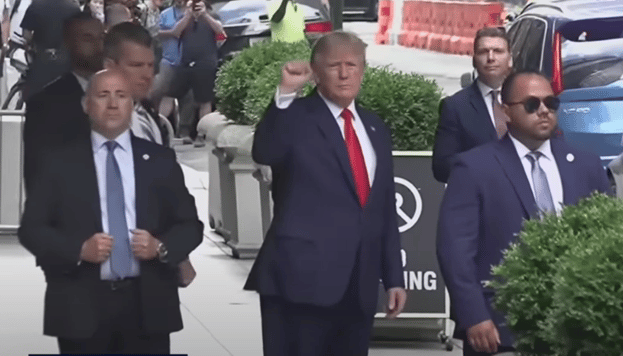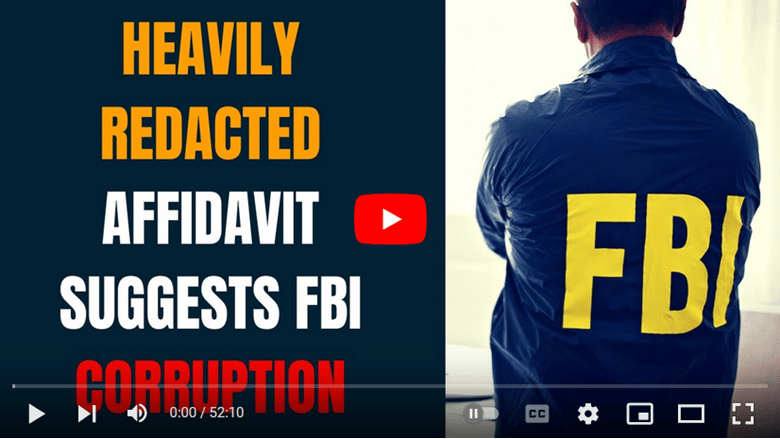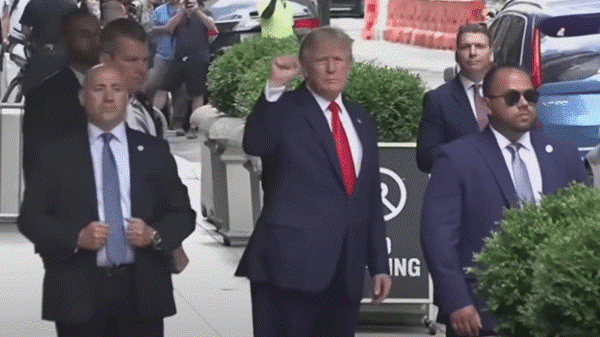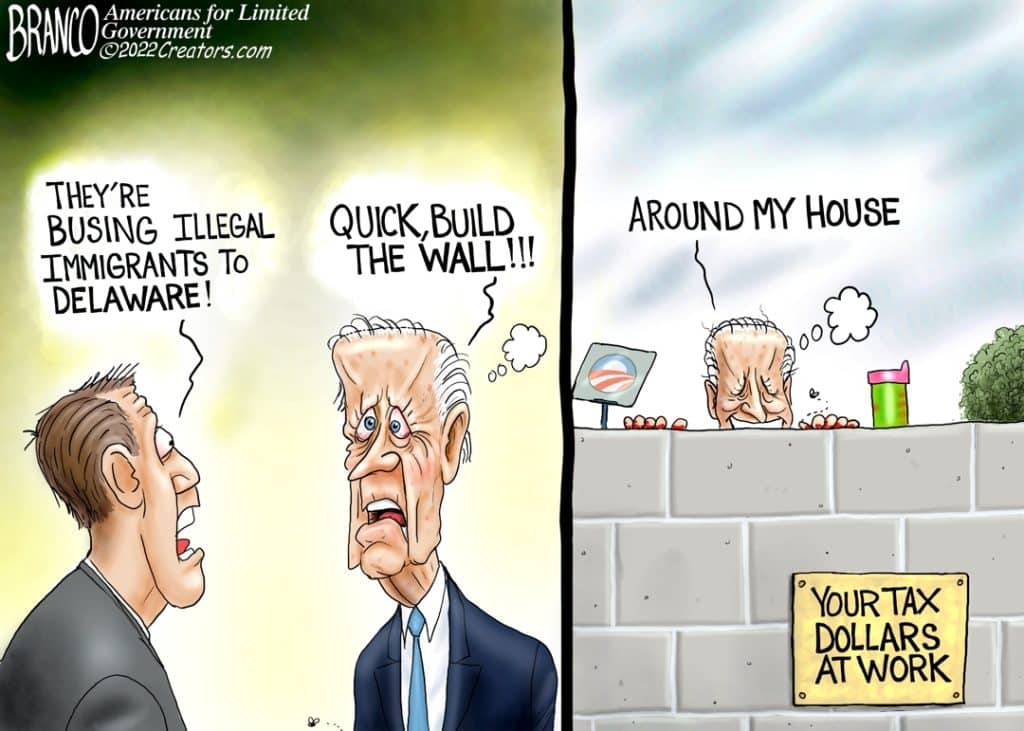Aug. 30, 2022
Permission to republish original opeds and cartoons granted.
FBI did not disclose Trump’s Jan. 19, 2021 declassification order of Russiagate documents to the federal magistrate judge in warrant affidavit
By Robert Romano
The federal warrant affidavit the Federal Bureau of Investigation (FBI) relied on to search former President Donald Trump’s residence in Palm Beach, Fla., Mar-a-Lago — at least its redacted version — bears no mention of a Jan. 19, 2021 declassification order by Trump of documents related to the Justice Department’s investigation of Trump that falsely accused him and his 2016 presidential campaign of being Russian agents.
This key omission — along with several pages of redactions — raises significant questions about whether the FBI fully disclosed all information relevant to the search warrant to the federal magistrate judge, Bruce Reinhart, before the FBI raided Mar-a-Lago on Aug. 8, including any relevant exculpatory information, especially any and all information that Trump had declassified these materials before ever he left office, that almost certainly would have leaned against issuing the warrant.
Either that, or there is the unlikely event Reinhart let the FBI redact information about Trump’s Jan. 19, 2021 declassification order, even though its public information available on Archives.gov and should have been disclosed in the public interest.
In the declassification memorandum, entitled, “Memorandum on Declassification of Certain Materials Related to the FBI’s Crossfire Hurricane Investigation,” Trump outlined what materials he had requested for declassification from the Crossfire Hurricane investigation: “At my request, on December 30, 2020, the Department of Justice provided the White House with a binder of materials related to the Federal Bureau of Investigation’s Crossfire Hurricane investigation. Portions of the documents in the binder have remained classified and have not been released to the Congress or the public. I requested the documents so that a declassification review could be performed and so I could determine to what extent materials in the binder should be released in unclassified form. I determined that the materials in that binder should be declassified to the maximum extent possible.”
There were a lot of responsive documents, but the FBI wanted redactions, which Trump granted in the declassification order: “In response, and as part of the iterative process of the declassification review, under a cover letter dated January 17, 2021, the Federal Bureau of Investigation noted its continuing objection to any further declassification of the materials in the binder and also, on the basis of a review that included Intelligence Community equities, identified the passages that it believed it was most crucial to keep from public disclosure. I have determined to accept the redactions proposed for continued classification by the FBI in that January 17 submission.”
And Trump clearly declassified whatever wasn’t to be redacted, stating, “I hereby declassify the remaining materials in the binder. This is my final determination under the declassification review and I have directed the Attorney General to implement the redactions proposed in the FBI’s January 17 submission and return to the White House an appropriately redacted copy.”
But redacted versions of the documents were never returned to the White House by the FBI by the time Trump was ready to leave office, nor have they been published since then, even though they should have been shortly after the declassification order.
In fact, Senate Judiciary Committee Ranking Member Chuck Grassley (R-Iowa) and Sen. Ron Johnson (R-Wis.) have been trying to obtain these documents for more than a year, in a Feb. 15, 2022 letter and an Oct. 2021 letter to Attorney General Merrick Garland, demanding to know why they have not been disclosed.
Grassley and Johnson wrote in the Feb. 2022 letter, “We remain concerned that over one year from the date then-President Trump directed the Justice Department to declassify certain Crossfire Hurricane records the Justice Department has not only failed to declassify a single page, the Department has failed to identify for Congress records that it knows with certainty to be covered by the declassification directive.”
Appearing on Fox Business with Dagen McDowell on Aug. 15, Sen. Johnson said that not a single page of the documents had been published by the Justice Department, stating, “I know President Trump was trying to declassify or had declassified information the tail end of his administration. We have not seen one page of that.”
Johnson added, “To me, this is looking more and more like a dispute over the President's declassification authority.”
Johnson is right, and sure enough, the affidavit does include a short letter from one of Trump’s attorneys to the Justice Department in May, outlining the Article II Presidency’s broad authority under the Constitution over classified information.
One of the cases cited by Trump’s attorney is Department of Navy v. Egan, wherein the U.S. Supreme Court confirmed the President’s of classification of sensitive national security documents derive from his Article II constitutional vesting of executive powers, not from any Congressional statute: “The President, after all, is the ‘Commander in Chief of the Army and Navy of the United States.’ U.S. Const., Art. II, 2. His authority to classify and control access to information bearing on national security and to determine whether an individual is sufficiently trustworthy to occupy a position in the Executive Branch that will give that person access to such information flows primarily from this constitutional investment of power in the President and exists quite apart from any explicit congressional grant.”
The affidavit also included a phone interview with Breitbart.com quoting former Department of Defense chief of staff Kash Patel, who said he personally witnessed the declassification himself, but that the documents remained unaltered and had retained their classified markings: “The White House counsel failed to generate the paperwork to change the classification markings, but that doesn’t mean the information wasn’t declassified. I was there with President Trump when he said ‘We are declassifying this information.’”
This is all relevant information, not only for Judge Reinhart, but the entire nation. Former President Trump appears to be planning to run for President again in 2024, and yet, he could be about to be imprisoned for what appears to have been a lawful exercise of presidential powers while still in office, threatening our very constitutional system in perhaps its greatest crisis since 1860.
Fortunately, Trump’s legal team is also fighting to get a special master appointed to consider which documents seized by the FBI were privileged, including those that might have been shielded by executive privilege and/or attorney-client privilege, and overall is mounting a Fourth Amendment case against the unprecedented raid itself.
Ultimately, there needs to be some accounting for why the Jan. 19, 2021 memorandum — perhaps the best evidence that Trump was declassifying troves of documents before he left office and that the Justice Department was not cooperating with those orders — was apparently not disclosed to Judge Reinhart in the affidavit, or if it was, why Reinhart is letting the FBI hide it from the American people.
Either, the FBI hid Trump’s Jan. 19, 2021 declassification order from Reinhart, or Reinhart let the FBI redact information about it when it’s public information. Both would serve the ends of keeping the documents Trump clearly declassified out of public view.
The real question is: Where the heck are the American people’s declassified documents? They should be released immediately, and this witch hunt brought to a prompt end by federal courts acting in the best interests of the Constitution by pouring ice cold water on this catastrophe before it really gets out of hand.
Robert Romano is the Vice President of Public Policy at Americans for Limited Government.
Cartoon: Walls Are Closing In
To view online: https://dailytorch.com/2022/08/cartoon-walls-are-closing-in/
Click here for a higher level resolution version.
Video: Mar-a-Lago Raid Redactions: What's the FBI Hiding?
To view online: https://www.youtube.com/watch?v=-pmRjafETwY


Kevin Brock: Unsealed Mar-a-Lago search warrant affidavit reveals the government has no case against Trump
By Kevin Brock
When two dozen or more FBI agents searched former President Trump’s residence three weeks ago, most Americans initially were left wondering what in the world must Trump have done. After all, a prodigious FBI search logically indicates an equally prodigious violation of some federal statute; therefore, it must be really serious. One former Department of Justice (DOJ) official told Politico that the evidence sought “was likely so pulverizing in its force” that it would “eviscerate” the possibility of the optics for such an invasive law enforcement action not being good.
Well, it’s now pretty official: The optics aren’t good.
Everyone in America, from plumber to president, is constitutionally protected from a government search that lacks adequate cause.
We now know why the DOJ wanted the affidavit — which is supposed to articulate the probable cause needed for a legitimate search — to be kept under seal. After the magistrate who authorized the search forced the DOJ to unseal a redacted version, two realities came into better focus.
First, the affidavit confirmed that the FBI’s investigation was triggered in January 2022 at the request of the National Archives, which wanted certain documents, especially classified documents, that it considered to be presidential records to be turned over to it by Trump. Second, from what I have seen, I don’t believe the affidavit articulates how a federal law was or is being broken. For those who hold out hope that the affidavit’s redacted sections fill that gap, there is almost no chance that they do. (More on that below.)
As to the first point, this matter is, as suspected, nothing more than a document dispute that was chugging along, appropriately, as a negotiation behind the scenes and apparently making some progress. I don’t see anything in the affidavit asserting a refusal by Trump to cooperate.
Any clinging hope — in certain quarters — that the affidavit possessed “pulverizing” cause to believe Trump was engaged in a truly serious federal violation can — I think — be considered dashed. The pipe dream that Trump was engaged in espionage, actively providing secrets to an enemy I think is as fanciful as the Steele dossier’s Moscow hotel bed reverie. And, no, I don’t believe a smoking gun of espionage or something equally shocking will be in the redacted sections. If the FBI had that, it would have fronted that in the unredacted portions.
As to the second and more important point, the affidavit’s probable cause statements focus on only half of what is needed to show a possible violation of the federal statutes that are cited in the warrant. The affidavit does a reasonable job of establishing cause to believe Trump possessed a range of classified materials — or at least once-classified materials — and that those materials were located in his residence.
But that’s not all that’s needed — in this case in particular. A criminal violation of those statutes only exists if it can be established that the person being investigated was not authorized to possess, store, transfer or copy those documents. This is an easy element to establish against anyone in America. Except one person.
The unredacted parts of the affidavit make no attempt to articulate cause that Trump was not authorized to have these documents in his home. The reason is that, as president, he had broad, legally intimidating authority, established by law and court determinations, to declassify any and all documents and to determine what is and is not a presidential record. Trump and his legal team have asserted that this authority was exercised while he was still president. Therefore, a violation of these fairly low-level and seldom-prosecuted document-oriented statutes cannot be proven.
I don’t think there’s much chance that the affidavit’s redacted portions contain some novel legal theory undercutting this broad, well-established presidential authority. Affidavits for intrusive searches of a private home — the most extreme action the government can take against a resident of the United States, short of arrest — are not the place for advancing theories. Probable cause must be built on facts.
The redacted sections are considerable. Redaction is supposed to be utilized only to protect sensitive methods and techniques — in other words, how the government came by its information that it doesn’t want to publicly divulge so it can keep using those tactics or protect providers of information. A good and prudent example would be the use of confidential human and/or technical sources. A bad example would be citing press reports, a la the Carter Page Foreign Intelligence Surveillance Act affidavit.
The redacted portions therefore, normally, will simply cover how the FBI supported its assertions in the unredacted sections that Trump possessed classified materials in his residence — i.e., what confidential or sensitive sources were used to establish those facts. Don’t expect anything more.
The situation does not look good for the government. The Ivy League-educated attorneys of the DOJ had to know this adventure had little chance of an eventual successful prosecution. The use, therefore, of a highly intrusive search of a home simply as a forcing function to retrieve documents for the National Archives — and then not follow through with actual charges — spikes the potential abuse needle dramatically and will not help quiet the growing suspicion that this was more of a political hitjob to take Trump off the chessboard than it was the pursuit of blind justice.
I am often asked if the FBI had no choice but to pursue the National Archives request and open a case. Yes, it had a choice and, no, it didn’t have to open this investigation. The FBI declines to initiate cases involving more serious violations all the time.





